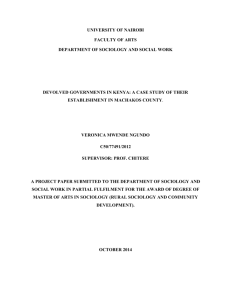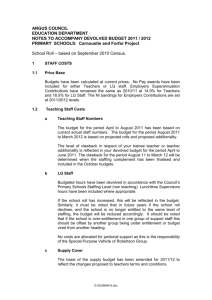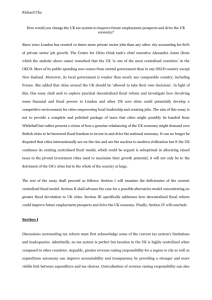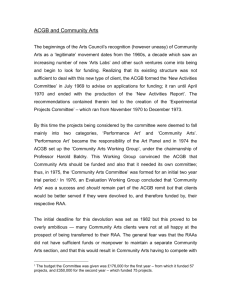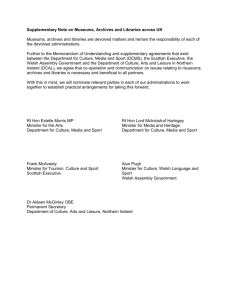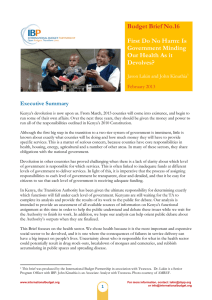Seminar 3: The Europeanization of Intergovernmental Relations
advertisement
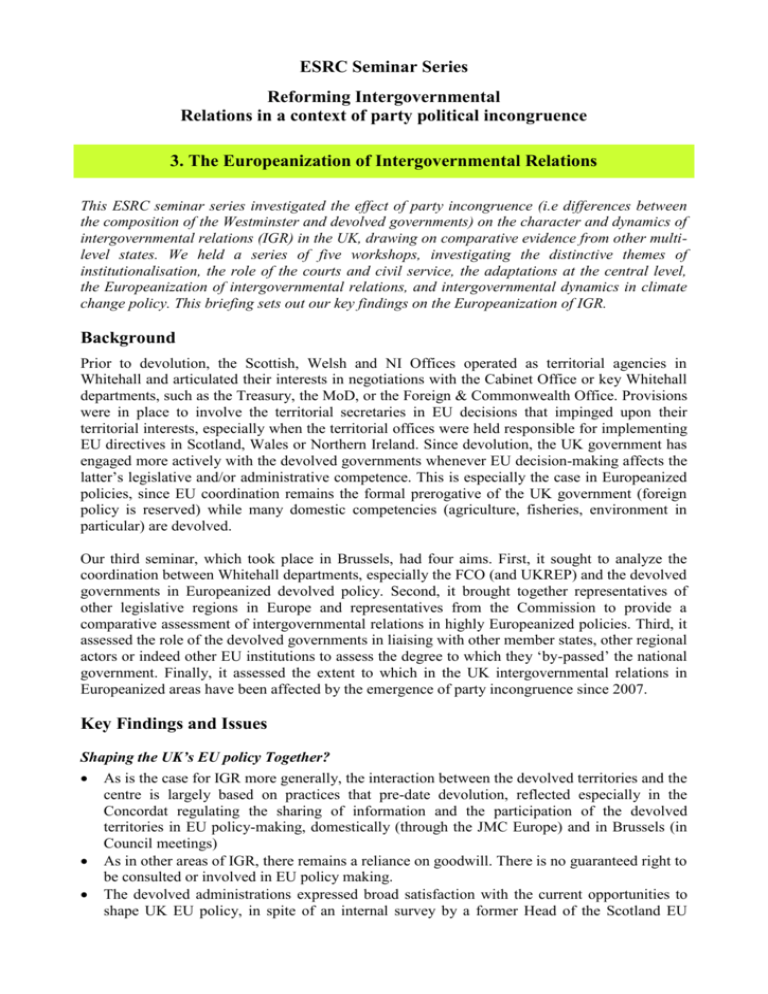
ESRC Seminar Series Reforming Intergovernmental Relations in a context of party political incongruence 3. The Europeanization of Intergovernmental Relations This ESRC seminar series investigated the effect of party incongruence (i.e differences between the composition of the Westminster and devolved governments) on the character and dynamics of intergovernmental relations (IGR) in the UK, drawing on comparative evidence from other multilevel states. We held a series of five workshops, investigating the distinctive themes of institutionalisation, the role of the courts and civil service, the adaptations at the central level, the Europeanization of intergovernmental relations, and intergovernmental dynamics in climate change policy. This briefing sets out our key findings on the Europeanization of IGR. Background Prior to devolution, the Scottish, Welsh and NI Offices operated as territorial agencies in Whitehall and articulated their interests in negotiations with the Cabinet Office or key Whitehall departments, such as the Treasury, the MoD, or the Foreign & Commonwealth Office. Provisions were in place to involve the territorial secretaries in EU decisions that impinged upon their territorial interests, especially when the territorial offices were held responsible for implementing EU directives in Scotland, Wales or Northern Ireland. Since devolution, the UK government has engaged more actively with the devolved governments whenever EU decision-making affects the latter’s legislative and/or administrative competence. This is especially the case in Europeanized policies, since EU coordination remains the formal prerogative of the UK government (foreign policy is reserved) while many domestic competencies (agriculture, fisheries, environment in particular) are devolved. Our third seminar, which took place in Brussels, had four aims. First, it sought to analyze the coordination between Whitehall departments, especially the FCO (and UKREP) and the devolved governments in Europeanized devolved policy. Second, it brought together representatives of other legislative regions in Europe and representatives from the Commission to provide a comparative assessment of intergovernmental relations in highly Europeanized policies. Third, it assessed the role of the devolved governments in liaising with other member states, other regional actors or indeed other EU institutions to assess the degree to which they ‘by-passed’ the national government. Finally, it assessed the extent to which in the UK intergovernmental relations in Europeanized areas have been affected by the emergence of party incongruence since 2007. Key Findings and Issues Shaping the UK’s EU policy Together? As is the case for IGR more generally, the interaction between the devolved territories and the centre is largely based on practices that pre-date devolution, reflected especially in the Concordat regulating the sharing of information and the participation of the devolved territories in EU policy-making, domestically (through the JMC Europe) and in Brussels (in Council meetings) As in other areas of IGR, there remains a reliance on goodwill. There is no guaranteed right to be consulted or involved in EU policy making. The devolved administrations expressed broad satisfaction with the current opportunities to shape UK EU policy, in spite of an internal survey by a former Head of the Scotland EU Office, which suggested a lack of consultation by some Whitehall departments with the devolved governments ahead of Council meetings in Brussels. Like their counterparts in other multi-level states in Europe, devolved territories were more involved in decisions on issues where the link with their competencies was direct (e.g. fishing, agriculture). But they were largely left out of decisions where the link with devolved competence is indirect (e.g. in strategic decisions on the UK contribution to the EU budget, or Treaty Reforms). The need to reach a common stance in the European arena makes the cost of a non-agreement relatively high for all partners concerned. By-passing central government? The devolved administrations have their own institutional presence at the heart of Brussels. These Brussels’ offices provide a local home to ministers visiting Brussels and offer a good opportunity for networking with the Commission, Parliament or other legislative regions or member-states. But the direct impact of these offices on the EU legislative process is difficult to discern. The Committee of the Regions is not seen as a significant outlet for representing regional interests, although Welsh representatives within CoR have been at the forefront of UK-led initiatives within the Committee. We found little evidence to suggest a preference on the part of devolved governments for ‘bypassing’ central government to liaise directly with the EU. Even under conditions of party incongruence, the devolved territories – like other comparable regions across the EU - prefer an ‘insider-strategy’, shaping the EU policies of their member state. This reflects the primacy of member states in an EU context, as well as the diminished prominence of regions in the EU since EU enlargement. The Scottish and Welsh representatives emphasized the comparative advantage of being part of the Home Civil Service and of having previous experience in Whitehall previously. Within Brussels, the UK devolved territories were given access to UKREP. Their level of access exceeded that of, for example, their Flemish or Catalan counterparts in relation to the Belgian/Spanish Representation in Brussels. Party incongruence has had a minimal effect on EU engagement. Brussels-based officials from the devolved administrations noted that their remote location kept them at a distance from any intergovernmental political tensions at home, and allowed them to maintain close and cordial interactions with their UK counterparts. The election of a nationalist government in Scotland led to a preference for networking with other small member states rather than with strong regions with legislative powers. Recommendations/Action Points: The agenda items of JMC Europe should be made available on line as part of the dedicated JMC/IGR portal specified in policy paper 2. Unless the early disclosure of what has been agreed endangers the UK negotiation position in the Council, a communiqué listing the outcome of these negotiations should be made available (if necessary afterwards). The Concordat on the Co-ordination of European Union Policy Issues should have an enlarged scope to ensure information is shared on key UK strategies on EU budgetary and Treaty reforms as well as Structural Fund Policies. More information sharing should also occur in matters EU soft-law, in particular the Open Method for Coordination. Devolved ministers should be systematically included in UK delegations to the Council on issues where the importance of EU policy to devolved competencies is beyond doubt. In some policy areas, such as fisheries (where Scotland holds seventy percent of the UK fishing stock), a devolved minister should routinely be permitted to lead the UK delegation. Following German practice, the devolved governments may consider agreeing on the appointment of a common representative to the UK government. (S)he should be attached to the FCO and obtain observer status in JMC Europe meetings. The common representative could ensure that the devolved territories are adequately informed of European developments in high politics areas, such as Treaty reform or budgetary negotiations. The devolved governments and parliaments should liaise more routinely with their MEPs, especially in view of the elevated role of the European Parliament in the European legislative process to that of a co-legislator in most areas.



